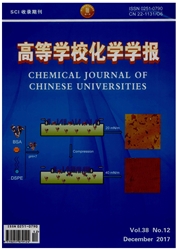

 中文摘要:
中文摘要:
以聚乙烯醇(PVA)、N-乙烯基咪唑(VyIm)和四氟硼酸(HBF4)为自由基接枝共聚反应的主要原料,合成了含离子液体结构的聚乙烯醇接枝,N-乙烯基咪唑四氟硼酸盐(PVA-g-VylmBF4),并引入磷钨酸(PTA)和聚乙二醇(400)咪唑四氟硼酸盐离子液体(PEG400IMBF4)提高了聚合物的实用性能.采用溶液浇铸法制备了聚乙烯醇接枝N-乙烯基咪唑四氟硼酸盐/磷钨酸/离子液体聚合物电解质复合膜(PVA-g-VyImBF4/PTA/PEG400IMBF4).利用傅里叶红外光谱(FTIR)、差示扫描量热仪(DSC)、热重分析(TGA)、扫描电子显微镜(SEM)、交流阻抗及循环伏安等测试方法对聚合物电解质进行了表征.结果表明,当171(PVA-g-VyImBF4):m(PTA):m(PEG400IMBF。)=4:2:1.8时,所制备的聚合物电解质的室温电导率可达到3.267×10^-3/cm;电化学稳定窗口为4.4V,具有良好的热稳定性和优良的实用性能.
 英文摘要:
英文摘要:
Polyvinyl alcohol-grafl-N-vinylimidazole fluoroboric acid salt copolymer (PVA-g-VyImBF4 ) was synthesized with main raw materials such as polyvinyl alcohol (PVA), N-vinylim-idazole (VyIm) and fluorobo- ric acid( HBF4 ). With phosphotungstic acid(PTA) and ionic liquid (PEG400IMBF4) as materials of impro- ving practicability, PVA-g-VyImBFJPTA/PEG4OOIMBF4 polymer electrolyte composite membrane was pre- pared via solution casting method. The polymer structure was characterized by means of Fourser transform in- frared spectroscopy(FTIR) , differential scanning calorimetry ( DSC ) , thermogravimetric analysis ( TGA ) and scanning electron microscope (SEM). The electrochemical performance of polymer electrolyte membrane was studied by alternating current(AC) impedance and cyclic vohammetry. The results show that the conductivity of the polymer electrolyte membrane can get to 3.267 ×10^-3 S/cm measured at room temperature and the elec- trochemical stability window can get to 4.4 V when m ( PVA-g-VylmBF4 ) : m (PTA) : m ( PEG400IMBF4 ) is 4:2:1.8.
 同期刊论文项目
同期刊论文项目
 同项目期刊论文
同项目期刊论文
 期刊信息
期刊信息
